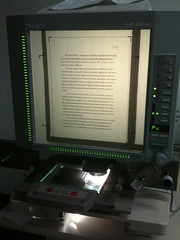Remember conducting library research using microfiche?
I’m here to tell you, when it comes to OLDER dissertations at some colleges, microfiche is still alive and well! I recorded a 3.5 minute video in the library at the University of North Texas today documenting my process of scanning a 139 page microfiche-based dissertation. The main glaring error in this video is I said it was 2009… Perhaps I was flashing back due to my use of older technologies….
Thankfully the UNT library has a computer with Adobe Acrobat Pro connected to a microfiche reader, so I didn’t have to print all 139 pages of this dissertation and pay 10¢ per copy. There is no charge for scanning to PDF! 🙂 This entire process (yes, to obtain a SINGLE document) took me about 45 minutes.
After creating a single PDF file of this dissertation, I asked the reference librarian if he wanted to keep a copy and make it available online for others who might be interested in it. He wasn’t sure if their system allowed for those kind of additions. The dissertation I scanned was published in 1995. More recently published dissertations are, of course, available online. One example of a digital UNT dissertation I’ve looked up recently is “Cognitive playfulness, innovativeness, and belief of essentialness: Characteristics of educators who have the ability to make enduring changes in the integration of technology into the classroom environment” by Lemoyne Dunn. I referenced this research in my April 2009 post, “Creativity requires a willingness to make mistakes and be wrong,” but hadn’t actually found or read the research until today. I’m glad it’s available in digital form!
It’s easy to take digital document accessibility for granted. Today I had a brief “appreciation course” to remind me it’s not always easy to find and obtain an older document you want!
Technorati Tags:
library, scan, texas, unt, microfiche, scanner, dissertation



Comments
3 responses to “The Joys of Microfiche Scanning”
For a few years, I worked in academic libraries. They actually had a microfiche reproducing machine which allowed you to make a copy of the microfiche and take it home! Instead of 10 cents per page to print, it was 10 cents per microfiche reproduction. It was a photographic process, and I believe I had much of the ERIC collection all to myself in a file box. Of course, whenever I wanted to use a lesson plan from the fiche, I had to go to a library to read it!
I then worked at a large public library and did preservation microfilming (large, large copystand-like thing) and microfilmed some cool stuff, including all of Thomas Nast’s original works. This was followed up by a stint at a preservation and conservation center where I organized items for microfilming including all of the Montgomery Ward catalogs, Frederick Law Olmsted’s photographs, and the large scrapbooks from the Metropolitan Opera House in New York.
Microfilm and microfiche bring back good memories for me. It was exciting times, those early days of digital reproduction!
I’m glad you have good memories of microfiche, Kathy! It certainly did represent a quantum leap forward for information access, when more costly books and other physical media could not be obtained by the library for cost or other reasons.
For me, microfiche has always been associated with more time consuming searches for materials. The inability to do a full text search on a microfiche document is, functionally, a big deal. When I made this video yesterday, I was wondering how many students today have never encountered microfiche. I was also thinking about digital document preservation, with the degredation of the fiche slides as well as the need to maintain the fiche readers. There is a good NASA science podcast about these issues my son and I listened to last week. This article tells the story of the lunar image recovery project:
http://www.pbs.org/wgbh/nova/insidenova/2010/05/think-you-had-it-bad.html
Maybe at some point libraries will acquire a higher speed method, via software, to scan and index microfiche holdings more readily and similarly “digitally resurrect” these resources. Due to the original copyright terms of the materials, however, that may be unlikely.
Long live microfiche! I just pinged/trackbacked this post. Would love to have you weigh in. Feel free to link to your video in the comments section.